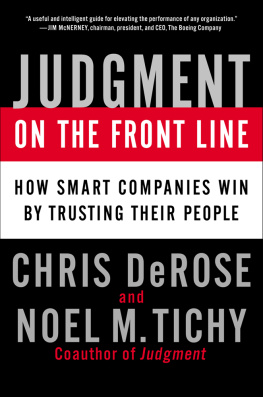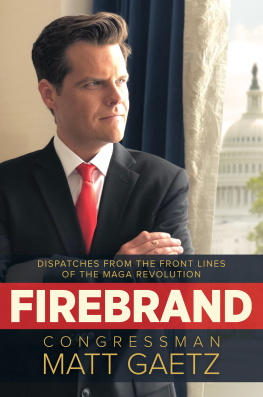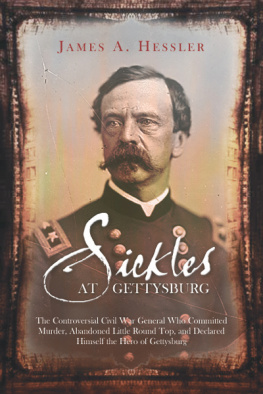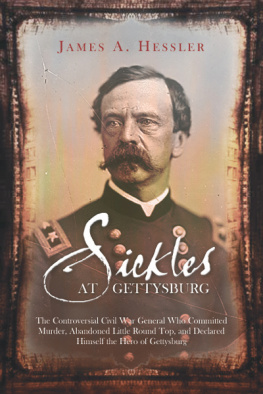Copyright 2019 by Chris DeRose
All rights reserved. No part of this publication may be reproduced or transmitted in any form or by any means electronic or mechanical, including photocopy, recording, or any information storage and retrieval system now known or to be invented, without permission in writing from the publisher, except by a reviewer who wishes to quote brief passages in connection with a review written for inclusion in a magazine, newspaper, website, or broadcast.
Regnery History is a trademark of Salem Communications Holding Corporation
Regnery is a registered trademark of Salem Communications Holding Corporation
Cataloging-in-Publication data on file with the Library of Congress
Cover design by Joshua Taggert
ISBN 978-1-62157-805-5
ebook ISBN 978-1-62157-895-6
Published in the United States by
Regnery History
An imprint of Regnery Publishing
A Division of Salem Media Group
300 New Jersey Ave NW
Washington, DC 20001
www.Regnery.com
Books are available in quantity for promotional or premium use. For information on discounts and terms, please visit our website: www.Regnery.com.
For Hannah DeRose, my wife, who showed me how happy a man can be. I love you beyond measure, today and for all time.
CONTENTS
YEAR of meteors! brooding year!
I would bind in words retrospective,
some of your deeds and signs:
O year all mottled with evil and good!
year of forebodings!
As I flit through you hastily, soon to fall and
be gone, what is this book,
What am I myself but one of your meteors?
Year of Meteors, 185960
by Walt Whitman, Leaves of Grass
OvertureOpening Night
I t was a pleasant Sunday afternoon in Washington. Two gentlemen in top hats encountered one another. How do you do? asked Barton Key, extending his hand.
Villain, you have defiled my bed, said Daniel Sickles. He pointed a pistol at Key and fired.
Murder! cried Key, United States Attorney for the District of Columbia. Dont shoot me. Dont murder me.
Keys cries went unheeded. There was another shot. Key fell to the ground. Sickles advanced on him slowly and fired again. Key lay mortally wounded on his back. His killer stood triumphantly over his body.
Applause!
But a lot had happened since then. America had spent that time in the thralls of an illicit affair, savage killing, and sensational trial, grasping after every detail. The shooting touched off a national conversation on male honor, female virtue, marriage, fidelity, and the rule of law. Newspapers covered the story with more speed and space than any that had come before. The Evening Star declared that the name Daniel Sickles was oftener pronounced than that of any other one living.
The jury had announced its verdict two weeks earlier, closing the matter for official purposes. But the public was not ready to let go.
It was the sole topic of conversation wherever men meet, or women either, in boardrooms, boudoirs, and bars. It was discussed in Spanish, German, and French, in London pubs and cafes on the Champs Elysees, and on the beaches of Bermuda and Hawaii. Closer to home, it displaced coverage of violence in Kansas, the breakdown of politics in Washington, the fracturing of the Democrats, and the ascendancy of the Republicans.
Helen and Lucile Western, known as the Star Sisters, rushed their play into production. David Hanchett, a Shakespearean tragedian, was cast in the role of vengeful husband. Rehearsals were held during the trial, and the script was updated accordingly. Audiences loved it. Others were horrified. People were similarly divided over the whole Sickles matter.
As one critic wrote of the play: de gustibus non est disputandum : in matters of taste, there can be no dispute.
ACT I
The Washington Tragedy
Chapter One
A Reckless Gaiety
Thursday, February 24, 1859
Over that gay and brilliant company how near and fearful a doom impended!
The New York Times
D aniel Sickles could see the White House from his window. He dressed the part of an up-and-coming congressmanas he had well before he was oneand went downstairs to greet his wife and daughter. Many members of Congress came to the capital without their loved ones. But Sickles found life dull and wearisome without his wife Teresa and daughter Laura.
Laura was six, restored to health after a bout of fever and chills. Her baptism was coming soon. And President James Buchanan would serve as godfather.
When their morning meal was finished, Sickles boarded his coach and traded the peace of home for the frenzy of the House of Representatives. Teresa and Laura were headed for Centre Market, an errand another hostess might have left for servants.
Congress was in the final days of session, scrambling to put together the national budget on their way out of town. Some were looking to save money by shutting down the Navy Yards. Like the one in Brooklyn, critical to national security as well as Sickless
Sickles left the Capitol and traveled up Pennsylvania Avenue. The historic Ewell House, leased by Sickles, was just north of the White House and among the most prestigious addresses in the capital. An invitation there meant an evening with senators, congressmen, diplomats, journalists, cabinet members, and, sometimes, the president. It was the perfect place for a party, such as the one underway when he arrived.
Sickles entered his home to the sounds of laughter, talking, and the clinking of glasses, the merry scene illuminated by gaslight and reflected in chandeliers and mirrors. Buchanans Washington was a return to form after the bleak Franklin Pierce presidency, where the social scene suffered from a first lady mourning the death of her son. William Stuart, correspondent for the New York Times , wrote: I have never known Washington more delightful. Henry Watterson, the young reporter for the Philadelphia Press , proclaimed Mr. and Mrs. Sickles the universal favorites, providing the most generous welcome in Washington.
Sickles spotted his wife among the colorful dresses and dark suits, greeting guests in her sweet and amiable manner. People who never set foot in Washington could read about Teresas beauty in national newspapers: her Italian luster and depth of eye and delicacy of feature making her remarkable...for something especially soft, lovely, and youthful.
Tonights guest of honor was Madame James Gordon Bennett, wife of the powerful publisher of the New York Herald . To be sure, there had been differences in the past: names were called (Double Dealing Dan), accusations made, and a libel lawsuit filed. But it had
Also there was Chevalier Henry Wikoff, a living, breathing sign that you had arrived at the best party in town. Heir to a Philadelphia fortune, kicked out of Yale for riding with a young lady, he began his Washington social career in the days of Andrew Jackson. From there, he gained prominence in courts throughout Europe, from King Louis in Paris to the Pope in the Vatican to the Czar in the Kremlin.
In London, he became attach of the American delegation, where he met the Duke of Wellington and King William IV, and he briefly became a spy for the British against the French. He became friends with the Bonaparte family, who were then between empires, particularly Louis, and wrote a biography of him. Wikoff returned to America as the manager of Fanny Elssler, the famed dancer, with whom he engaged in a turbulent and long-lasting romance. Wikoff had been engaged to the niece of a senior London banker. When she broke it off and moved, Wikoff found her, and, well...kidnapped was the word they used. Wikoff made the most of fifteen months in a Genoese prison, writing a bestselling account: My Courtship and its Consequences . James Bennett nicknamed him Chevalier because of his foreign affect and adventures throughout Europe. The sobriquet became true twelve years later when he was knighted by the king of Spain.
Next page






